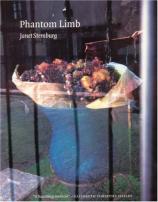Excerpt
Excerpt
Phantom Limb

Family
I go into the house. The books, the maps, the postcards from friends...everywhere there are visible signs of solace. The rooms we inhabit, the objects we surround ourselves with, the words we write ? what are these if not a highly articulated set of consolations? Then something happens, and I'm inconsolable. p.22
Without the wig, my mother is beautiful. Thin gray hairs, my hand smoothing them away from her brow. Soft skin, still. Her finely articulated bones under my fingers. Her silver hair streams back from a high hairline. Her thin nose arches like a ballerina's foot on point. My mother resembles a Russian dancer, one of the old ones who become teachers and stand in class beside a piano, beating time. p.30
'It's no fun. Do you know what I do when I leave my parents' apartment? You must never say another word about this, but I get into my car, roll up the windows, and I scream.'
All over America, adults are screaming. I hear them in small towns in Maine, in front of doorman buildings on Park Avenue, and along the Wilshire Corridor of Los Angeles, screaming in sealed cars in border towns in Texas, in the driveways of two-family homes in Wisconsin, in Boston and La Crescenta. I hear America screaming its grown children trying not to be heard. p. 90
When it was time for Dora to go into a nursing home, Minna told me she walked out of her apartment and didn't look back. My mother did the same thing. They leave like gladiators, forward to face their fates. Their daughters close the doors behind them. p. 103
Later she tells me how much it means to hear me introduce her as my beloved mother. She says it thrills her. 'When you talk to people, you have such a sparkle in your eyes,' she says to me. 'I've fallen in love with you.'
And I with her. This is the grace of the last years, the children coming to understand the contradictions in their parents, not to reconcile them but encompass them in a larger love. p. 106-107
Phantom Limb
Why would anyone in her right mind want a phantom limb? She {the visiting nurse} doesn't answer; that's not her job. But from my reading, I know the answer. A phantom limb turns out to be essential for walking. When a prosthesis is strapped on, the phantom shoots out and 'fills' it. The brain then begins to accept the artificial leg as though it were a part of the body, able to be used for walking. p. 34
Most of the tine my mother doesn't wear either artificial leg, but she keeps both close by, just in case. The apartment seems filled with them. They move round a lot: a leg against the sink, a leg propped against the kitchen counter, a leg leaning against the aluminum railing that helps her get up from the toilet.
My mother asks if I could please bring her the light leg. The heavy leg is now in the back of a closet, serving as a receptacle in which to store rolls of gift-wrapping paper. p. 34 35
'There's a theory that pain felt after an amputation is more or less the same pain that the patient felt before losing the limb. It makes sense; the neurological pathways in and out of the brain were laid down in the past, so they may well go right on carrying old impulses. Because your mother has had a history of pain, her condition is likely to last a long while.'
'Can it disappear, once and for all?'
'No one knows..the phantom itself tends to fade or telescope and disappear as a function of time. But a phantom may return decades after it seems to be gone.'
'Is it a memory?'
'Physically, no ? it's normal experience continuing as it must. It's the real thing, not a pathological entity. But, in a purely psychological sense, one could say it's the body's unwillingness to relinquish its past.' p. 53
Telling the Story
Writers hunt for old diaries left in attics, filmmakers for footage stored and forgotten in basements. We pry open lids, convinced that secrets must be brought to light. We go one questioning until we elicit that one response that inspires us: "Why do you want to know?" p. 45
One thing about my aunts, they always knew how to behave in an illness. When I was little, my mother's sister Pauline came bringing magical presents. An iced cake with satin ribbons attached to tiny gifts baked inside. A wicker basket with strawberries nestling in a pretty floral cloth. With the berries would come the story of when she was sick as a little girl.
"My mother knew I adored strawberries. Even if she didn't have a penny to her name, she'd find a way to get me some."
My mother stood in the doorway, thumbs tucked in, lips clamped. After Pauline left, I was given to understand that her stories were fabrications, embroideries on the truth or worse.
"She just wants to prove that my mother loved her best."
From what I can gather, my mother's judgment was correct. Pauline's memories were fictions, a means for drawing attention to her superior claims. But I thought there was something to be said for a happy story, especially if it had been made up. P.39-40
Excerpted from Phantom Limb © Copyright 2002 by Janet Sternburg. Reprinted with permission by University of Nebraska Press. All rights reserved.
Phantom Limb
- hardcover: 148 pages
- Publisher: University of Nebraska Press
- ISBN-10: 0803242964
- ISBN-13: 9780803242968







